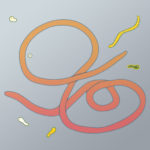Girl nearly goes blind after parasite in dog mess that travelled from her stomach to her eyeball
When Susan Knight noticed her baby daughter had an irritation in one of her eyes, she assumed it was due to a pre-existing squint.
But when Millie was three, surgeons correcting her eye condition noticed scarring on her right retina.
After several trips to Great Ormond Street, Millie was diagnosed with the rare condition known as Toxocariasis – which she had caught after ingesting the eggs of the Roundworm parasite, Toxocara.
There are around 50 cases reported each year in the UK, usually in young children.


Millie, 13, has been on antibiotics since a parasite infection affected her vision. Undaunted, she now hopes to be part of the Team GB Winter Paralympic Ski team in the future
Toxocara is found in the faeces of dogs and cats, and can contaminate the soil in gardens, parks and even playgrounds.
If accidentally ingested, the roundworm eggs hatch into larvae that penetrate through the walls of the digestive tract and in rare cases can migrate to the eyes and cause serious sight problems.
Millie, who lives near Canterbury and had grown up on a farm, had spent her young life surrounded by animals and picked up the parasite when she was one.
However, in her case the infection had remained dormant for several years and she had displayed no symptoms. Then when Millie was six the condition reactivated – unusually this time in her left eye. She experienced bouts of feeling poorly but it wasnt until her teacher noticed a decline in her sight at school that doctors realised what must have happened.
Her mother said: We looked after all manner of animals when Millie was young, from sheep to household cats and dogs.
Millie first contracted the condition at around the age of one, which remained undercover for years until it finally attacked when she was six. During a three week period, Millie had lost a lot of her sight.
We were first referred to an optometrist and then swiftly to Great Ormond St Hospital, as Millie’s vision became worse.
Millie ended up having to make weekly visits to Moorfields Eye Hospital, where the infected eye was treated with steroids. She has been on antibiotics ever since.
Millie has scarring in her central vision and is classified as B2 in disability terms – a stage between being blind and visually impaired.
There’s a lot more bacteria right outside your front door than you would like, particularly if you own a pet. Dogs especially, since they don’t bury their stool, can leave your yard quite a contagious place if not cleaned properly and scooped on a regular basis. While showing little evidence, parasites can invade your dog’s body, live in his digestive system and produces eggs, which are eventually shed through the feces, contaminating the soil and water sources surrounding it. The eggs become viable embryos after about two to four weeks in the environment, usually in dirt or sand, and survive up to two years due to its high resistance to temperature changes and chemicals. In that time, the embryos can lay up to an alarming 200,000 eggs per day!
Millie Knight, for example, first contracted Toxocariasis around the age of one, and yet she didn’t fully experience the consequential effects until she turned six years old. It’s hard to keep a one-year-old’s hands clean and dirt-free – and for Millie, this was no exception. While playing outside, and unbeknownst to her parents, she had accidentally ingested a parasite that stemmed from nearby lingering animal waste. The infection remained dormant in her body for five years until one day she noticed a subtle decrease in eye strength. Within the next three week period, Millie lost most of her sight in her left eye. In a similar conclusion to Amiee’s story, Millie was put on strong antibiotics, but still lost a great deal of vision due to scarring, and now her left eye is classified as a B2 in disability terms, meaning midway between visually impaired and completely blind.
Its sad that we have to have tragic stories like these to get our attention. Unfortunately, there is no vaccination in existence or in development that can be given to young children to prevent another similar situation. The number one thing we can do is to pick up after our dogs – remove the waste before the eggs become invasive zygotes. It is also important that we take our pups to the veterinarian for their yearly checkup to test for worms, as well as administer both flea and heartworm medication all year round. If your dog has long hair, make sure to brush it and wash it often, while checking for any fecal matter that could have gotten stuck to it, especially around their buttocks. As for when you are with your kids, be extra careful when walking through public parks, have antibacterial wipes on hand, and make sure any sandboxes are covered when not in use.
Amiee and her family decided to rise up from their horrific experience and join up with Britain’s “Keep Britain Tidy Campaign.” The campaign covers many subjects promoting a clean and safe environment such as “Bin it for good”, “Break the bad habit”, and its new pet waste removal campaign, “There is no poo fairy” , represented by Amiee herself. She can be found on many billboards and posters, showing her severe eye injury in an effort to educate dog owners of the importance of cleaning up after their pets.
 Toxocariasis is an illness found in humans that occurs when they are infected with parasitic roundworms, originating from either the fecal matter of dogs and foxes (Toxocara canis), or cats (Toxocara cati). Although most people might display symptoms similar to the flu, there are certain instances, where the illness can turn into a more severe form known as Ocular Toxocariasis, that has the potential to cause blindness.
Toxocariasis is an illness found in humans that occurs when they are infected with parasitic roundworms, originating from either the fecal matter of dogs and foxes (Toxocara canis), or cats (Toxocara cati). Although most people might display symptoms similar to the flu, there are certain instances, where the illness can turn into a more severe form known as Ocular Toxocariasis, that has the potential to cause blindness.
Urgent advice: Ask for an urgent GP appointment or get help from NHS 111 if:
You think youve swallowed soil, sand or animal poo and you have:
You can call 111 or get help from 111 online.
Toxocariasis only needs to be treated if it causes symptoms.
The main treatment is medicine to kill the worms.
If the worms spread to your eye, steroid medicine may be used to help stop damage to your eye. Sometimes you may also need surgery to remove the worms or treat any problems with your vision.